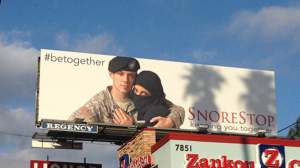December 13-2013

The billboard showing an American solder snuggling with a woman in niqab has now gone up in Chicago, but more people are likely seeing it on the web and in their newspapers.
After weeks of slowing traffic on Sunset Boulevard in Hollywood, the billboard is now up in downtown Chicago, where cars honk and passersby stop to stare.
Responses range from praise for its diversity to derision—and sometimes anti-Islamic slurs.

. . . Iranian in niqab
The billboard is actually an advertisement for an anti-snoring device made by a California company, but the advertising goal has been overshadowed by the shock value of the photo, which shows a real American soldier with an Iranian-American actress-singer, who has never before worn niqab.
The woman’s left hand is on the soldier’s chest, and a wedding band is clearly visible on her ring finger to signal that this represents a married couple. The point of the ad is that even such a diverse husband and wife as shown in the ad can live comfortably together once his snoring is stopped by the firm’s product.
William Andres, an Iraq war veteran who now lives in Clinton, Illinois, thinks the billboard’s underlying message of tolerance is important, and he reached out to the company to applaud its efforts
“It brings to life some of the issues Muslims face here in America,” Andres told McClatchy News. “A lot of people associate Muslims with terrorists. They have the wrong idea.”
Andres said he knows from personal experience how raw the billboard is for some Americans, even as others celebrate its bridging of cultures.
After six years of Air Force service, he left the military in 2006 and took a job with a security contractor in the Middle East. In Dubai, he began dating an Iranian woman named Negar. They married in August 2011 and have an 18-month-old daughter.
While most of their relatives and families have welcomed their union, Andres said they field a lot of questions in their small Midwestern town where he said a Christian war veteran with a Muslim Persian wife “is kind of an oddity.”
McClatchy said it emailed, tweeted or called a dozen people who had criticized the billboard in messages posted on the company’s website, some of them in overtly racist terms. But it said none responded.
A typical negative comment reads: “If you were the LAST company on F——— EARTH , I would not buy from you. I hope a Muslim cuts your head off.”
A positive comment reads: “I am a lesbian, been with my partner for 33 years now, and it is so nice to see an ad with diversity, and making it OK. Thank you so much!!!”
Ibrahim Hooper, national communications director for the Council on American-Islamic Relations (CAIR), said the billboard has evoked a fascinating mix of reactions in the Muslim-American community.
“Those who support it see it as a Muslim soldier and his wife and say, ‘What could be wrong with that?’” Hooper said. “Those who are critical view it as an exploitation of the shock value of seeing this juxtaposition of a soldier and a Muslim woman. We’re choosing to take the most positive interpretation of the ad.”
Christian de Rivel, marketing director for SnoreStop, based in Camarillo, California northwest of Los Angeles, came up with the idea for the billboard.
“We want to show that we are embracing diversity,” he said. “We wanted something unique. This is the ultimate diversity.”
Aseel Machi wrote a deeply critical opinion column about the billboard last month for The Guardian newspaper in London. Machi said very few Muslim women wear the full headdress depicted in the ad.
“SnoreStop did not stop at profiling and stereotyping what a Muslim woman looks like, they placed her in the arms of an American soldier,” she wrote. “As an Iraqi, when I see a man dressed in camouflage and matching hat with a Muslim woman in his arms, I think of the atrocities committed against not only men, but women and children during the brutal years of ‘democracy and liberation’ that ravaged my country on the whims of US and international forces.”
Thus, just as many Americans view anyone wearing niqab as a terrorist, Machi was viewing anyone in a US military uniform as a rapist, neatly circumscribing the problem of stereotyping while denouncing stereotyping.
Machi added: “Women and girls – some as young as 15 – reportedly raped by soldiers between 2003 and 2004 may have something to say about this billboard.”
Army Sgt. Paul Evans, 24, is the real-life model shown in the billboard. He deeply supports its message, also partly based on personal experience.
When Evans was attending the Marion Military Institute five years ago in his native Alabama, he fell in love with a young black woman. He was stunned by the backlash their relationship sparked, starting with deep disapproval from his parents. While the parents came around, eventually inviting the woman home to a Thanksgiving dinner, the experience stayed with Evans, and he jumped at the chance to portray the soldier in the billboard.
“I’m really all about diversity,” Evans told McClatchy. “I’ve had to deal with problems with discrimination a lot.”
Evans said he’s gotten mainly positive feedback from US men and women in uniform from around the globe, and from Muslims in the Middle East and elsewhere.
After a drill last month at Marine Corps Camp Pendleton near San Diego, Evans’ commanding officer called him aside, extended his hand and congratulated him on the ad.
However, Army Capt. Will Martin, a spokesman for the California National Guard, said Evans’ superior officers counseled him that he had pushed up against Army regulations restricting US military endorsements of commercial products while in uniform.
The young woman in the billboard, also 24, is Lexy Panterra, an aspiring singer who attended Sacramento High School in California and now lives in Los Angeles. Her father is an Iranian immigrant and her mother is of European descent.
Like Evans, Panterra (her stage name) actively supports the idea behind the billboard.
“I want everyone to be equal and respected,” she said. “People shouldn’t be separated so much. Everyone should be with whoever they want to be with.”
Panterra said she occasionally attended church with her mother as a child, but is not especially observant now of Christianity or Islam. Her father, she said, loves the billboard. “He tells me I’m a Muslim,” she said. “He says I was born Muslim.”
Panterra said she got her passion and interest in music from her grandmother, whom she described as a songwriter, poet and singer in Iran before the revolution.
